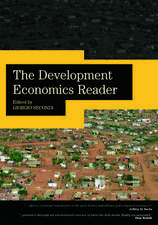Governance Reform in Africa: International and Domestic Pressures and Counter-Pressures: Routledge Explorations in Development Studies
Autor Jerome Bachelarden Limba Engleză Hardback – 24 ian 2014
No study has sought to systematically examine the political forces, both international and domestic, behind the successful conduct of governance reform in Sub-Saharan Africa. Yet, coordination, collaboration and mutual support between international and domestic actors is critical to push individual governments onto the path of reform. This book shows that while international and domestic pro-reform pressures are important, an analysis of anti-reform pressures is also necessary to explain incomplete or failed reform.
The main theoretical arguments are structured around four hypotheses. The hypotheses are theoretically generated and tested over four case studies – Madagascar, Kenya, Nigeria and Chad. On this basis, the good governance socialization process is inductively developed in the concluding chapter. This model illustrates how governance practices can evolve positively and negatively in all countries of Sub-Saharan Africa, based on the nature and relative strength of international and domestic pressures and counter-pressures.
| Toate formatele și edițiile | Preț | Express |
|---|---|---|
| Paperback (1) | 299.87 lei 6-8 săpt. | |
| Taylor & Francis – 25 apr 2016 | 299.87 lei 6-8 săpt. | |
| Hardback (1) | 1169.78 lei 6-8 săpt. | |
| Taylor & Francis – 24 ian 2014 | 1169.78 lei 6-8 săpt. |
Din seria Routledge Explorations in Development Studies
- 8%
 Preț: 389.80 lei
Preț: 389.80 lei -
 Preț: 310.45 lei
Preț: 310.45 lei -
 Preț: 325.72 lei
Preț: 325.72 lei -
 Preț: 325.72 lei
Preț: 325.72 lei -
 Preț: 152.57 lei
Preț: 152.57 lei -
 Preț: 155.44 lei
Preț: 155.44 lei -
 Preț: 311.41 lei
Preț: 311.41 lei - 8%
 Preț: 388.92 lei
Preț: 388.92 lei -
 Preț: 326.96 lei
Preț: 326.96 lei -
 Preț: 311.41 lei
Preț: 311.41 lei -
 Preț: 281.90 lei
Preț: 281.90 lei -
 Preț: 324.67 lei
Preț: 324.67 lei -
 Preț: 489.26 lei
Preț: 489.26 lei -
 Preț: 482.74 lei
Preț: 482.74 lei -
 Preț: 416.22 lei
Preț: 416.22 lei -
 Preț: 389.38 lei
Preț: 389.38 lei - 28%
 Preț: 821.06 lei
Preț: 821.06 lei -
 Preț: 389.38 lei
Preț: 389.38 lei - 18%
 Preț: 1000.27 lei
Preț: 1000.27 lei - 18%
 Preț: 998.71 lei
Preț: 998.71 lei - 26%
 Preț: 848.96 lei
Preț: 848.96 lei - 18%
 Preț: 1000.27 lei
Preț: 1000.27 lei - 18%
 Preț: 999.61 lei
Preț: 999.61 lei - 16%
 Preț: 299.87 lei
Preț: 299.87 lei -
 Preț: 299.52 lei
Preț: 299.52 lei -
 Preț: 411.42 lei
Preț: 411.42 lei - 14%
 Preț: 297.99 lei
Preț: 297.99 lei - 18%
 Preț: 1057.05 lei
Preț: 1057.05 lei - 18%
 Preț: 1060.25 lei
Preț: 1060.25 lei - 18%
 Preț: 1170.84 lei
Preț: 1170.84 lei - 18%
 Preț: 1000.27 lei
Preț: 1000.27 lei - 25%
 Preț: 544.50 lei
Preț: 544.50 lei - 31%
 Preț: 765.01 lei
Preț: 765.01 lei - 28%
 Preț: 851.46 lei
Preț: 851.46 lei - 18%
 Preț: 1000.27 lei
Preț: 1000.27 lei - 25%
 Preț: 767.38 lei
Preț: 767.38 lei - 31%
 Preț: 763.78 lei
Preț: 763.78 lei - 14%
 Preț: 301.33 lei
Preț: 301.33 lei - 18%
 Preț: 1110.74 lei
Preț: 1110.74 lei -
 Preț: 485.07 lei
Preț: 485.07 lei
Preț: 1169.78 lei
Preț vechi: 1426.57 lei
-18% Nou
Puncte Express: 1755
Preț estimativ în valută:
223.91€ • 243.30$ • 188.20£
223.91€ • 243.30$ • 188.20£
Carte tipărită la comandă
Livrare economică 21 aprilie-05 mai
Preluare comenzi: 021 569.72.76
Specificații
ISBN-13: 9780415713450
ISBN-10: 0415713455
Pagini: 256
Ilustrații: 8 tables and 6 line drawings
Dimensiuni: 156 x 234 x 18 mm
Greutate: 0.63 kg
Ediția:1
Editura: Taylor & Francis
Colecția Routledge
Seria Routledge Explorations in Development Studies
Locul publicării:Oxford, United Kingdom
ISBN-10: 0415713455
Pagini: 256
Ilustrații: 8 tables and 6 line drawings
Dimensiuni: 156 x 234 x 18 mm
Greutate: 0.63 kg
Ediția:1
Editura: Taylor & Francis
Colecția Routledge
Seria Routledge Explorations in Development Studies
Locul publicării:Oxford, United Kingdom
Public țintă
PostgraduateCuprins
1. Introduction 2. Governance Reform in Africa: Engines and Obstacles 3. Madagascar (1997-2006): a Triumph of Democracy from the Streets 4. Kenya (1990-2007): from Moi’s ‘Goldenberg’ to Kibaki’s ‘Anglo Leasing’ Graft Scandals in the Shadow of Ethnicized Politics 5. Nigeria (1999-2007): the Anti-Corruption War and the Untouchables 6. Chad (1999-2008): the Failure of the World Bank’s Externally Monitored Governance of Petrodollars in a Fake Democracy 7. Conclusion: the Good Governance Socialization Process
Recenzii
"This is a refreshing and bold book that treats governance as a dynamic process involving power rather than as a condition or state that can be assessed in reference to specific numerical indicators. It breaks new ground as it analyzes the interactive role of international and domestic factors in shaping governance reforms. Together with its practical policy conclusion this is a book that should be must read for scholars and policy practitioners alike" - Goran Hyden, Distinguished Professor Emeritus, University of Florida, USA
Descriere
This book examines governance reform in Sub-Saharan Africa based on an analysis of international and domestic pressures and counter-pressures. It develops a four phase model explaining why governance reforms advance in some instances, whilst in others governance reforms stagnate or even relapse. It shows that while international and domestic pro-reform pressures are an important part of the story, an analysis of anti-reform pressures is also necessary to explain incomplete or failed reform. Counter-pressures help to explain the behavior of rulers which would otherwise appear irrational.





















